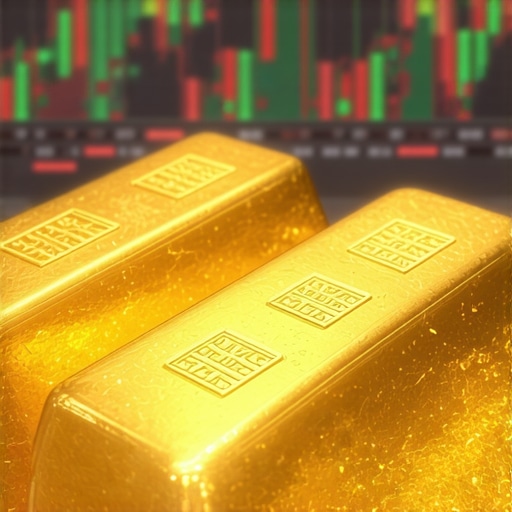Understanding Gold Trading in Volatile Markets
Trading gold can be a rewarding venture, especially in times of economic uncertainty. However, navigating the complexities of a volatile market requires a strategic approach. In this article, we will explore the best practices for trading gold effectively, ensuring that you maximize your investment while minimizing risks.
Stay Informed About Market Trends
One of the most crucial aspects of trading gold is staying updated on current market trends. Economic indicators, geopolitical events, and changes in central bank policies can significantly impact gold prices. Make it a habit to regularly check resources such as Gold Market Analysis: Current Trends and Future Predictions to understand how these factors influence the market.
Utilize Technical Analysis
Technical analysis involves examining historical price movements and patterns to forecast future price changes. By utilizing charts and various technical indicators, traders can identify potential buy and sell signals. Understanding price levels, trends, and volume can provide insights into market behavior, making it easier to make informed trading decisions.
Implement Risk Management Strategies
Effective risk management is essential for trading gold, especially in a volatile environment. Setting stop-loss orders can help protect your investments from sudden price drops. Additionally, consider diversifying your investment portfolio with gold stocks and ETFs. This not only spreads risk but also allows you to capitalize on different facets of the gold market. For more insights on diversification, check out Gold Stocks and Mutual Funds: Diversifying Your Portfolio.
Understand the Role of Gold in Economic Uncertainty
Gold is often viewed as a safe haven during economic downturns. Understanding its role in economic uncertainty can guide your trading strategy. For instance, when inflation rises or currencies weaken, gold prices typically increase. Familiarize yourself with articles such as The Role of Gold in Economic Uncertainty: Why Choose Gold as a Hedge? to gain deeper insights into these dynamics.
Keep Emotions in Check
Trading can evoke strong emotions, especially during volatile periods. It is vital to remain calm and stick to your trading plan. Avoid making impulsive decisions based on fear or greed, as this can lead to substantial losses. Having a clear strategy and adhering to it will help you navigate the ups and downs of the market.
Conclusion
In conclusion, trading gold in a volatile market requires a combination of knowledge, strategy, and emotional discipline. By staying informed about market trends, utilizing technical analysis, implementing risk management strategies, understanding gold’s role in economic uncertainty, and keeping emotions in check, you can enhance your trading success. For further reading on investment strategies, explore Gold Investment: A Comprehensive Guide to Buying Gold and leverage these insights to make informed decisions.
Explore Gold Investment Strategies for Smart Traders
As you delve deeper into the world of gold trading, it’s essential to explore effective investment strategies tailored for volatile markets. Understanding various approaches can enhance your ability to navigate fluctuations and capitalize on opportunities. For instance, consider adopting a long-term perspective while also being open to short-term trading techniques, as both can be beneficial depending on market conditions.
Leverage Gold ETFs and Mutual Funds
Investing in gold ETFs (Exchange-Traded Funds) and mutual funds can provide exposure to the gold market without the need to own physical gold. These financial instruments allow for diversification across different gold assets. If you’re interested in exploring this option further, check out Exploring Gold ETFs: Benefits and Pitfalls to Consider for a comprehensive overview.
Utilize Hedging Techniques
Hedging is a strategy used to offset potential losses in investments. In the context of gold trading, this could involve taking positions in futures contracts or options to protect against adverse price movements. Understanding how to implement these techniques can significantly enhance your risk management strategies. For more insights, visit Using Gold as a Hedge Against Inflation: Strategies.
Understanding the Impact of Global Events on Gold Prices
Global events such as political instability, economic downturns, and major financial crises can greatly affect gold prices. Being aware of these factors can help you make informed trading decisions. Regularly review articles that analyze the impact of such events, like The Impact of Global Events on Gold Prices: Analysis, to stay ahead of the curve.
Monitor Central Bank Policies
The policies adopted by central banks worldwide can significantly influence gold prices. For instance, when central banks increase gold reserves or lower interest rates, gold often becomes a more attractive investment. Understanding these dynamics is crucial for traders. For further exploration, check out How Central Bank Policies Affect Gold Prices.
Analyze Supply and Demand Trends
Gold prices are also influenced by supply and demand factors. Monitoring mining production, jewelry demand, and central bank purchases can provide valuable insights into market trends. For example, an increase in demand from Asian markets can lead to price surges. Familiarize yourself with Analyzing Gold Demand Trends: What Investors Should Know to better understand these elements.
Consider Diversification Beyond Gold
While gold can be a strong component of your investment strategy, diversifying into other asset classes can help mitigate risk. Consider including stocks, bonds, and real estate in your portfolio. This strategy can provide stability even during times of market volatility. For more detailed guidance on diversification strategies, see Gold Stocks and Mutual Funds: Diversifying Your Portfolio.
Stay Agile and Adapt to Market Changes
The gold market is dynamic, and traders must remain agile and responsive to changes. Regularly review your trading strategies and be willing to adapt based on new information or shifting market conditions. This approach will help you capitalize on opportunities while minimizing risks.
Conclusion
In summary, effective trading in volatile gold markets entails a multifaceted approach that incorporates various strategies and an understanding of external factors. By exploring gold investment options, utilizing hedging techniques, monitoring global events, and considering diversification, traders can position themselves for success. For further information, refer to Top Gold Investment Strategies for 2024 You Should Know to enhance your trading knowledge and skills.
Identifying the Best Gold Investment Opportunities
In the ever-evolving landscape of gold investments, recognizing the best opportunities is crucial for maximizing returns. This entails understanding market trends, analyzing historical data, and staying informed about geopolitical factors that could impact prices. To delve deeper into identifying promising gold investments, explore How to Spot Good Gold Investment Opportunities.
Utilizing Advanced Technical Analysis
Technical analysis involves studying price movements and trading volumes to predict future price behavior. Incorporating tools such as charts, indicators, and patterns can significantly enhance your investment decisions. For traders looking to refine their skills, the article How to Analyze Gold Market Trends Effectively provides valuable insights.
Understanding Gold Futures for Strategic Trading
Gold futures contracts allow investors to speculate on the future price of gold. This financial instrument can be particularly advantageous in volatile markets, enabling traders to leverage their positions. If you’re new to this concept, refer to Investing in Gold Futures: A Beginner’s Overview for a foundational understanding.
Exploring the Advantages of Gold IRAs
Gold Individual Retirement Accounts (IRAs) offer a unique avenue for investors looking to include precious metals in their retirement portfolios. This type of investment not only allows for tax-deferred growth but also provides a hedge against economic downturns. To learn more about the specifics, check out Exploring Gold IRA Options for Retirement Planning.
Choosing the Right Gold Dealers
Finding reputable gold dealers is essential for ensuring you receive fair prices and quality products. Researching dealers and understanding their pricing structures can save you money and lead to successful transactions. For tips on selecting the right partner, read How to Choose the Right Gold Dealers for Your Investment.
Assessing Gold Stocks and Mining Investments
Investing in gold stocks and mining companies can provide exposure to gold prices while potentially offering higher returns than physical gold. Analyzing the fundamentals of gold mining companies, including production costs and reserve levels, is crucial for making informed investment choices. For more information, visit Why Invest in Gold Mining Stocks? A Comprehensive Guide.
Diversifying with Gold Mutual Funds
Gold mutual funds are another option for investors seeking to diversify their portfolios. These funds typically invest in a mix of gold-related assets, offering a balanced approach to gold investment. To understand the pros and cons, check out Exploring Gold Mutual Funds: Pros and Cons.
Maximizing Returns on Gold Investments
To truly maximize returns, it is vital to implement strategic investment practices. This may include timing your purchases, leveraging market trends, and utilizing stop-loss orders to protect your capital. For further strategies, refer to Strategies to Maximize Returns on Gold Investments.
Conclusion
Investing in gold requires a multifaceted approach that includes understanding market dynamics, evaluating investment options, and staying informed about global events. By leveraging various strategies and continuously educating yourself, you can enhance your gold investment portfolio and increase your chances of success.
Understanding Gold ETFs: How to Invest Smartly
Exchange-Traded Funds (ETFs) that focus on gold can be a smart investment choice for those looking to gain exposure to gold without directly purchasing physical assets. Gold ETFs track the price of gold and can be traded on stock exchanges, making them accessible and liquid. For more insights into the benefits and pitfalls of gold ETFs, refer to Exploring Gold ETFs: Benefits and Pitfalls to Consider.
Benefits of Investing in Gold ETFs
Gold ETFs offer several advantages, including lower costs compared to buying physical gold, easy trading, and diversification within a single investment. Additionally, they allow investors to gain exposure to gold prices without the complexities of storage and security associated with physical gold. If you’re considering diversifying your portfolio with gold ETFs, check out Top 10 Gold ETFs to Diversify Your Portfolio.
Using Gold as a Hedge Against Inflation
Gold has historically been viewed as a hedge against inflation. During periods of rising prices, gold’s value tends to increase, preserving purchasing power. This makes it an attractive option for investors concerned about inflation eroding their savings. To understand how to effectively use gold as a hedge, consider reading Using Gold as a Hedge Against Inflation: Strategies.
Strategies for Inflation-Proofing Your Portfolio
Incorporating gold into your investment strategy can help mitigate risks associated with inflation. Allocate a portion of your portfolio to gold, whether through physical gold, ETFs, or mining stocks. This balanced approach can safeguard your investments during economic turbulence. For more detailed strategies, see Gold Investment Strategies for Smart Investors.
Top Gold Coins for Investment in 2024
Investing in gold coins can be a rewarding venture for collectors and investors alike. Certain coins, such as the American Gold Eagle and the Canadian Gold Maple Leaf, are highly sought after and recognized globally. These coins not only carry intrinsic value but also have the potential to appreciate over time. For a more comprehensive look at which coins to consider, visit Top 5 Gold Coins for Investment in 2024.
Factors to Consider When Buying Gold Coins
When purchasing gold coins, consider factors like purity, historical significance, and market demand. Additionally, understanding market trends and pricing can help you make informed decisions. Investing in gold coins can complement your overall gold investment strategy, providing both aesthetic and financial value.
The Impact of Global Events on Gold Prices
Gold prices are significantly influenced by global events such as geopolitical tensions, economic crises, and changes in monetary policy. Investors should stay informed about these events to anticipate potential market movements. For an in-depth analysis of how these factors can affect gold prices, read The Impact of Global Events on Gold Prices: Analysis.
Staying Ahead of Market Trends
To navigate the volatile gold market effectively, it’s essential to stay updated on current events and market trends. Regularly reviewing news articles, economic forecasts, and expert opinions can provide valuable insights. For further reading on forecasting gold prices, see Gold Price Forecasts: What to Expect in 2025 and Beyond.
Conclusion
In conclusion, investing in gold requires a nuanced approach that encompasses various strategies and a thorough understanding of the market. By exploring opportunities such as gold ETFs, coins, and IRAs, and leveraging insights from global events, investors can enhance their portfolios. As you navigate your gold investment journey, remember to stay informed and adaptable to maximize your success in this precious metal market.
Frequently Asked Questions About Gold Investment
What are Gold ETFs and how do they work?
Gold ETFs, or Exchange-Traded Funds, are investment funds that track the price of gold. They allow investors to buy shares that represent a specific amount of gold, eliminating the need for physical storage. Investors can trade these shares on stock exchanges just like stocks, providing liquidity and ease of access.
Why should I invest in gold?
Investing in gold can be a way to diversify your portfolio, hedge against inflation, and safeguard your wealth during economic uncertainty. Gold typically retains its value over time and can increase in price when other investments falter.
What are the best gold coins for investment?
Some of the best gold coins for investment include the American Gold Eagle, Canadian Gold Maple Leaf, and South African Krugerrand. These coins are recognized for their purity and are often sought after by collectors and investors alike.
How does inflation affect gold prices?
Inflation can lead to an increase in gold prices as investors seek to protect their purchasing power. As the cost of living rises, gold often becomes a more attractive investment, leading to higher demand and prices.
What factors influence gold prices?
Gold prices are influenced by various factors including geopolitical events, economic data, currency strength, and interest rates. Understanding these elements can help investors anticipate market movements.
Can I hold gold in my retirement account?
Yes, you can hold gold in certain retirement accounts, such as a Gold IRA. This allows you to invest in physical gold or gold-related assets while enjoying the tax benefits of retirement savings.
How do I choose a reliable gold dealer?
When selecting a gold dealer, look for reputable companies with positive reviews, transparent pricing, and a strong track record in the industry. Verify their credentials and check for any affiliations with professional organizations.
Is it safe to invest in gold during economic downturns?
Investing in gold during economic downturns can be a safe strategy, as it often retains or increases its value when other assets decline. However, it’s important to assess your individual financial situation and investment goals before making any decisions.
What are the tax implications of selling gold?
When you sell gold, you may be subject to capital gains tax on any profits realized. The tax treatment can vary based on how long you held the investment and your overall tax situation, so it’s advisable to consult a tax professional.
Final Thoughts on Gold Investment
In summary, investing in gold offers numerous benefits, including diversification, a hedge against inflation, and protection during economic turmoil. Whether you choose gold ETFs, coins, or other forms of investment, staying informed about market trends and global events is crucial to making wise investment decisions. By leveraging the insights provided in this guide and exploring various strategies, you can enhance your portfolio and navigate the complexities of gold investment successfully.










